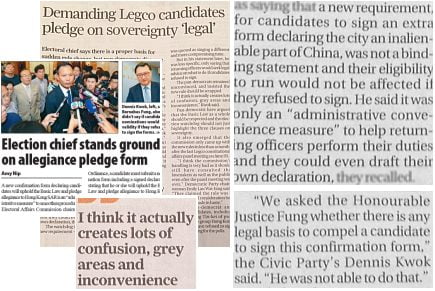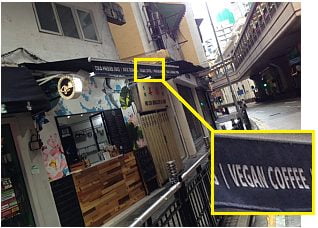One thing we know for certain about the ‘loyalty declaration’ newly required (or not) of Legislative Council candidates is that it was not plagiarized from something Michelle Obama once did. Apart from that, it’s a confused jumble of indecipherable vagueness that keeps getting more bewildering.
It was sudden – being announced just days before nomination of candidates began. It was carefully considered and thought-through, though you didn’t notice.
It was in response to public concerns – ‘confusion to electors’ – that candidates don’t understand the Basic Law, ‘particularly Article 1, Article 12 and Article 159 (4)’. It appeared as if from nowhere, and no-one recalls being confused, having asked for something like this, or indeed giving it a moment’s thought, ever.
It was legally binding and candidates couldn’t run without signing the declaration. It was just an administrative measure and you could be on the ballot even if you didn’t sign it. (Or it would be up to your friendly neighbourhood Returning Officer. Or it wouldn’t be. Would you like to draft your own declaration?)
If you signed it, thus acknowledging Hong Kong as an inalienable part of China, and then publicly stated an opposing view, you would face the wrath of some unspecified part of criminal law as a dirty lying pants-on-fire fibber. Or, it went without saying, signing the declaration was purely symbolic and couldn’t affect your rights to freedom of speech.
It was just duplicating the existing declaration candidates have always signed before running for election. Or it was just duplicating the oath new lawmakers make when taking office. Or it’s something brand new and freaky.
It’s a total and utter mess. And on this we have widespread agreement. Even contrary columnist Michael Chugani can’t find anything good to say about it.
What’s going on?
The whole episode has left Judge Barnabas Fung and his Electoral Affairs Commission looking even more absurd than when they try to ban people from commenting on candidates on Facebook. They said it could not be done! But this is about malevolence, not ineptness. We must look elsewhere.
Clearly, the original intention of this patriotism test was to intimidate people with incorrect ‘pro-independence’ political views. Clearly, it backfired – being greeted with derision and defiance as even moderate pro-dem candidates vowed not to sign.
The only people in Hong Kong who are this obsessive and paranoid about the ‘pro-independence’ thing are Beijing’s officials in the Liaison Office. They are also the only people in town who think forcing someone to make a public statement against their will – as a book-seller confesses on CCTV – is cool and effective.
It’s possible that the Liaison Office’s obedient attendant Chief Executive CY Leung acted on his own initiative and ordered the loyalty declaration as a pre-emptive kowtow to his Communist Party minders. But if it was his own idea he would probably have listened to the inevitable doubts of advisers and civil servants. The fact that the government pushed ahead with such a stupid plan suggests that it was fresh from the Liaison Office and not to be questioned.
Within days of its announcement, the loyalty declaration went from being a sinister example of creeping totalitarianism to an incomprehensible mess and laughable fiasco. This can’t be an accident. It takes effort, or at least determined omission, to implement a measure this badly. It looks as if someone, somewhere within the bureaucratic system was perfectly happy to let it fail.
Up in Hollywood Road, good news for everyone who wants their coffee made from plant matter rather than, say, pork…




loyalty declaration ?
What’s next ? A declaration of ethnic (Han) purity ?
And where have we seen this before ?
Unless…this is a trap to bait the pan-dems into withdrawing from the election. Sure, they’ll sue the government’s pants off if their candidacies are rejected, but by that time the election will be over and their veto will be lost.
Like the Standard and the SCMPalibaba, you occasionally flicker onto my screen for old times’ sake and I genuinely admire your devotion to world trivia.
Brexit, Nice, Trump, race war, ISIS…nix. Let’s hear it for the Soho triangle!
Je suis Hollywood Road.
The word is that it might be pursuable as fraud, or fraudulent representation if you’re paid by the letter.
Now is not the time to take a principle stand. The majority in the elected seats is wafer thin; and the HKU poll suggested a slight swing away from the dems.
With household names retiring, to be replaced by wet-behind-the-ears striplings, many of whom espouse violence, it may get sticky.
Not sure I really see the problem signing those even if you’re pro-independence:
Article 1 The Hong Kong Special Administrative Region is an inalienable part of the People’s Republic of China.
“Is” implies currently, but that doesn’t mean it always has to be (as proved by history). Also just rename it to People’s Republic of Hong Kong, and this doesn’t apply.
Article 12 The Hong Kong Special Administrative Region shall be a local administrative region of the People’s Republic of China, which shall enjoy a high degree of autonomy and come directly under the Central People’s Government.
Shall implies sometime in the future — and it doesn’t have an expiration date so again, no drama signing: It has already been these things, but doesn’t have to always be, doesn’t even have to be currently. Also, again rename it to People’s Republic of Hong Kong, and this doesn’t apply.
Article 159(4) No amendment to this Law shall contravene the established basic policies of the People’s Republic of China regarding Hong Kong.
Just good old fashioned meaningless, especially given that the established basic policies of the PRC regarding Hong Kong is to ignore the Basic Law altogether whenever it suits (see booksellers, HKU, National syllabus, this very declaration, etc). Also an argument can be made that as for most of it’s history, the PRC had no say over Hong Kong government whatsoever, so the established basic policy is non-ownership.
But let’s face it — independence will require armed revolution, rather than amendment of the Basic Law.